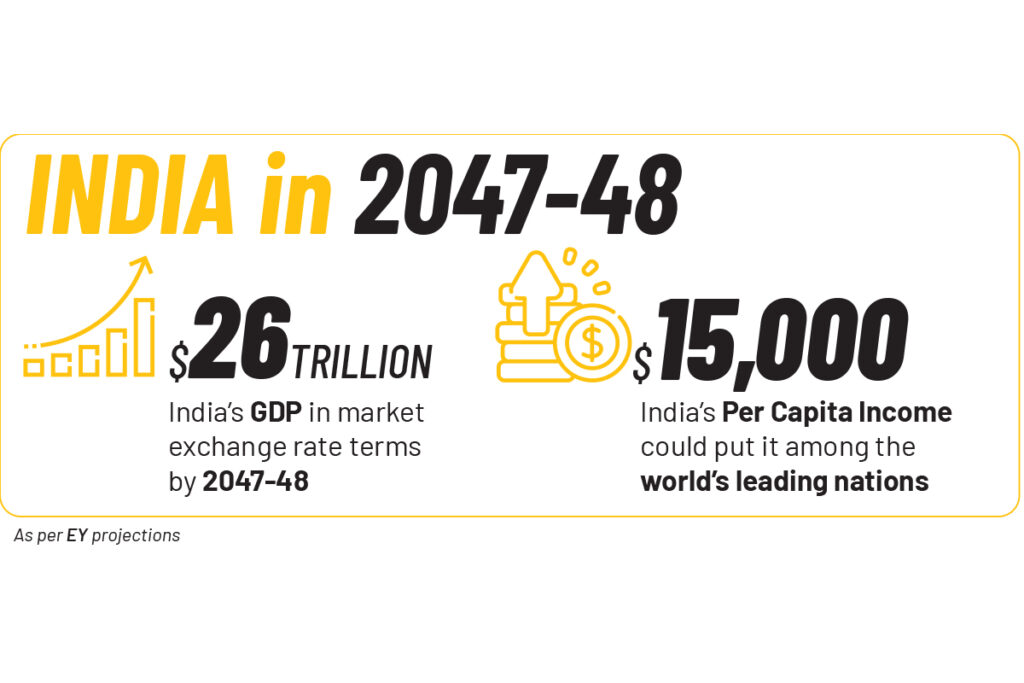With the global spotlight well and truly on India, India must seize the moment and its seat at the global high table
Words by Karan Karayi
India is a country known for many things. A rich history, a vibrant and diverse culture, and culinary traditions beloved the world over. But the increased appetite for all things India is not just because of the wondrous nature of its many cuisines, but for altogether different reasons.
Fortuitous though it may be, thanks to a combination of favourable factors such as a growing digital economy, a demographic dividend, and the “China Plus” policy adopted by many multinational companies, India is emerging as a key player in the global economy, attracting investors and businesses, and garnering heightened attention from the media.
India in 2047-48
- US$26 TRILLION
- India’s GDP in market exchange rate terms by 2047-48
- US$15,000
- India’s Per Capita Income could put it among the world’s leading nations
As per EY projections
The Global Economic Landscape
Before diving into India’s rise, let’s take a closer look at the global economic landscape, and understand how we got here.

To say the world is currently facing a glut of challenges would be to make an understatement. The ongoing Ukraine war and its ripple effects have cast a long geopolitical shadow over the global order. Inflation remains high in many OECD economies, with growth sluggish at best among major economies. As we write this, Japan and the UK have entered a recession, further deepening the malaise. What’s more, central banks continue to implement aggressive rate hikes, and with the global banking industry is facing turmoil, the idea of contagion risks being not-too-far-off cannot be eliminated.

In summary, the global economic outlook is gloomy, to use a word often repeated. Amid the gloam, India stands out as a beacon of hope. The International Monetary Fund (IMF) predicts that India’s economy will grow at a rate exceeding 6% in 2023-24, making it the fastest-growing economy in the world. The Reserve Bank of India has taken a breather from its rate hikes as inflation has moderated, and the economy is showing signs of recovery. The country’s manufacturing and services sectors are witnessing increased activity, and agricultural growth remains robust.

But even beyond these bulwark sectors, efforts in recent years that have grown India’s digital infrastructure and deepened social inclusion have seemed to put India on a trajectory to finally have its tryst with destiny. And these efforts to deliver the widest degree of social good are vital too, given the size, breadth, and depth of India’s talent pool, Seen as a whole, it is hard to argue against the idea of India, and little wonder why global enterprises are making a beeline for our shores.
India’s Strengths and Challenges
While India’s growth story holds immense promise, it is not without its weaknesses. As the most populous country in the world, India faces the challenge of providing quality education to its large workforce. Chinese spokespersons have raised concerns about the superior education of their workforce, highlighting the need for India to revamp its education system. The country also faces the task of generating employment opportunities for its vast working-age population.
To fully realise its potential, India needs to address its complex regulatory environment, which poses challenges for businesses. Countries like Indonesia and Vietnam offer more investment-friendly climates, attracting companies seeking alternatives to China. India must streamline its regulations and create a conducive environment for business to compete on a global scale.
India’s Attractiveness to Investors
Despite these challenges, India’s growth potential and favorable factors make it an attractive destination for investors. The country’s digital economy has gained significant traction, with the expansion of Big Tech companies like Apple. The recent launch of Apple’s retail stores in India created a buzz, signalling the company’s confidence in the Indian market. Moreover, the “China Plus” policy pursued by multinational companies has brought India into the limelight as an alternative manufacturing hub.
Investors are drawn to India’s young and dynamic workforce, which contributes to its demographic dividend. With the right education and skills, this workforce has the potential to drive innovation and fuel economic growth. Additionally, India’s strategic location and large consumer market make it an appealing investment destination.
Reforms for Sustainable Growth
To sustain India’s growth story, policymakers need to take proactive measures. First and foremost, the education system must be overhauled to produce skilled workers who can meet the demands of a rapidly evolving economy. Investments in education infrastructure and curriculum development are essential to equip the youth with relevant skills.

Furthermore, simplifying regulations and improving the ease of doing business will attract more investors and promote entrepreneurship. India can learn from countries like Indonesia and Vietnam, which have created investment-friendly environments and successfully attracted foreign direct investment.
While India’s moment in the sun has arrived, it is crucial to build on this momentum and address the remaining challenges head-on. By implementing necessary reforms, India can position itself as a global economic powerhouse and sustain its impressive growth trajectory.
An Eye on the Future

India’s rise as a prominent player in the global economy is a testament to its potential and resilience. Despite the challenges it faces, the country’s digital economy, demographic dividend, and the “China Plus” policy have placed it in the international spotlight. With sustained reforms and a focus on education and ease of doing business, India can continue to attract investors and drive economic growth. As India embraces its moment in the sun, it has the opportunity to shape its destiny and emerge as a leading economic force on the world stage. It is one that it must not let slip out of its grasp.


